Why investing in continued training is key for toolmakers and their employers
An ageing workforce coupled with years of underinvestment in skills has created the perfect storm for many employers, who now see the skills gap as a real threat to business productivity and growth. This is all too common across industries such as manufacturing and engineering, where demand for skilled toolmakers continues to grow.
Upskilling your workforce: The benefits
By investing in current teams and fresh talent through apprenticeships and continued professional training, businesses can not only nurture toolmakers of the future but can also unlock a range of benefits, such as;
1. Reshoring projects
Investing in homegrown talent opens the opportunity for businesses to reconsider overseas operations and bring production back to their home base. Holding the potential to increase quality control, reduce business costs and shorten supply chains.
2.Succession planning
As older experienced toolmakers begin to retire, focussing on training under-skilled team members provides a pathway for succession planning. This has often been overlooked in the toolmaking profession, and could help to ensure the smooth transition of key roles as senior employees retire or move on.
3.Increased loyalty and retention
With toolmakers in hot demand, the last thing businesses want is for their best employee to go to a competitor. Investing in continued training and development through an apprenticeship or open course demonstrates a commitment to employee development, which in turn fosters loyalty and helps to reduce turnover rates.
4.Cost effective recruitment
Apprenticeships offer a cost-effective alternative to traditional recruitment methods. If looking to take on someone new, they can be the perfect option for training and molding an individual to the requirements of the role.
Companies who invest in apprenticeships and continued professional development are often viewed favourably by prospective future employees and wider stakeholders, supporting brand image, future recruitment plans, and enhancing brand reputation as a responsible employer.

Grow current employees through the Precision Tooling Academy:
With a joint investment of over £1 million between In-Comm and Brandauer, the Precision Tooling Academy is committed to addressing the skills gap head-on. Participating companies gain access to tool making courses, allowing current employees to upskill and diversify their capabilities, ensuring a continued pipeline of skilled toolmakers within the industry. Through the academy, businesses can tap into a wealth of resources and expertise to navigate the complexities of training and development.
Discover more about the Precision Tooling Academy and how it can benefit your company.
Explore Toolmaking courses:
Explore a range of courses designed to enhance understanding of the toolmaking process, and equip employees with the skills needed to thrive in today’s competitive market. Our world-class facilities in Aldridge and Telford offer an immersive learning experience, ensuring your team receives the highest quality training.
Download the open apprenticeship courses for 2024 and unlock your team’s potential.
Featured Courses
Toolmaker and Die Maintenance Technician – Engineering Technician Level 3:
Learners pursue Level 2 and Level 3 Diplomas in Advanced Manufacturing Engineering. A two-week induction covers essential principles and additional courses include IOSH Working Safely, Manual Handling, Abrasive Wheels, and more. Discover more.
20 week toolmaker course:
This twenty-week course is to provide greater understanding of the tool making process by working alongside qualified and experienced trades personnel and undertaking first-hand, the techniques and principles employed in producing precision engineered tooling. Discover more.
Tool Process Design Engineer Level 6 Standard:
All learners will complete both on and off the job training elements for this standard and at the end of their programme will complete their Level 6 Apprenticeship as a Tool Process Design Engineer as well as achieving an EAL Level 6 qualification in Tool Design, a qualification which is bespoke to In-Comm and has been developed specifically for this apprenticeship. Discover more.
Considering hiring an apprentice?
Explore our range of resources or get involved at one of our open days:
Download your copy: A guide to apprenticeships
Receive your guide to talent attraction: A guide to recruitment
Get involved at our open days
Follow us on our socials to stay up to date with industry news and updates from In-Comm Training!

